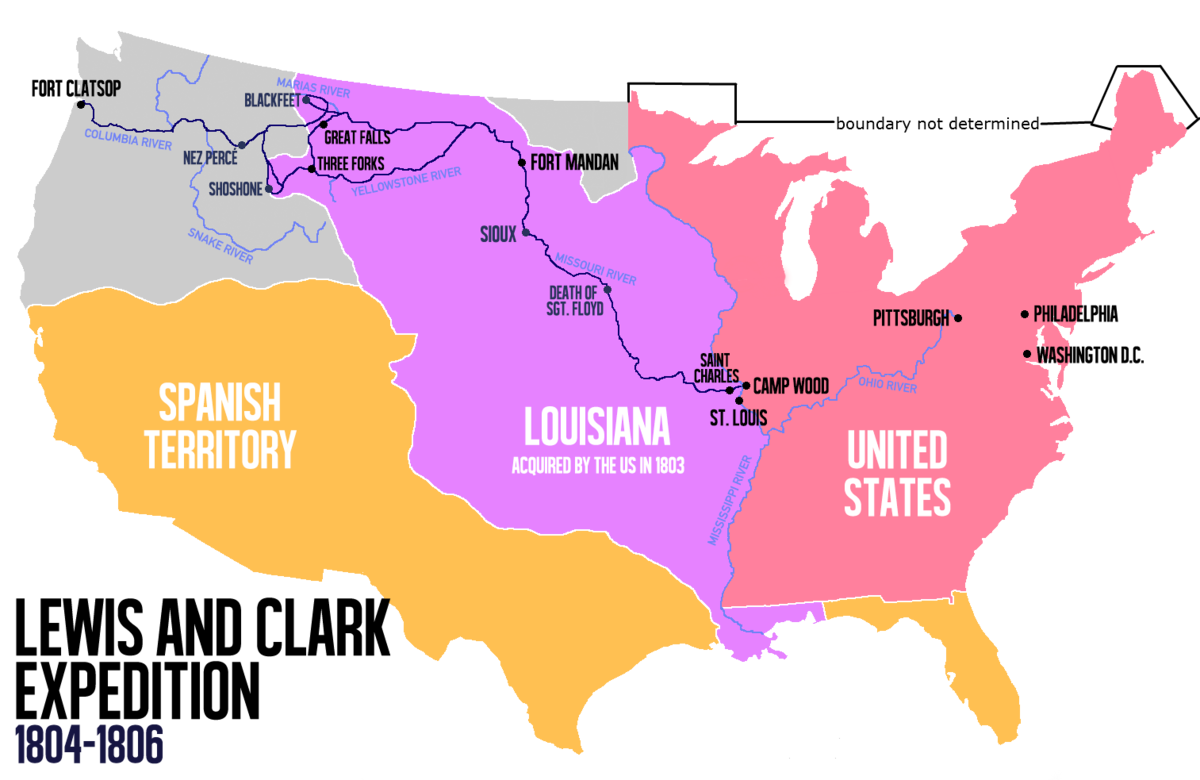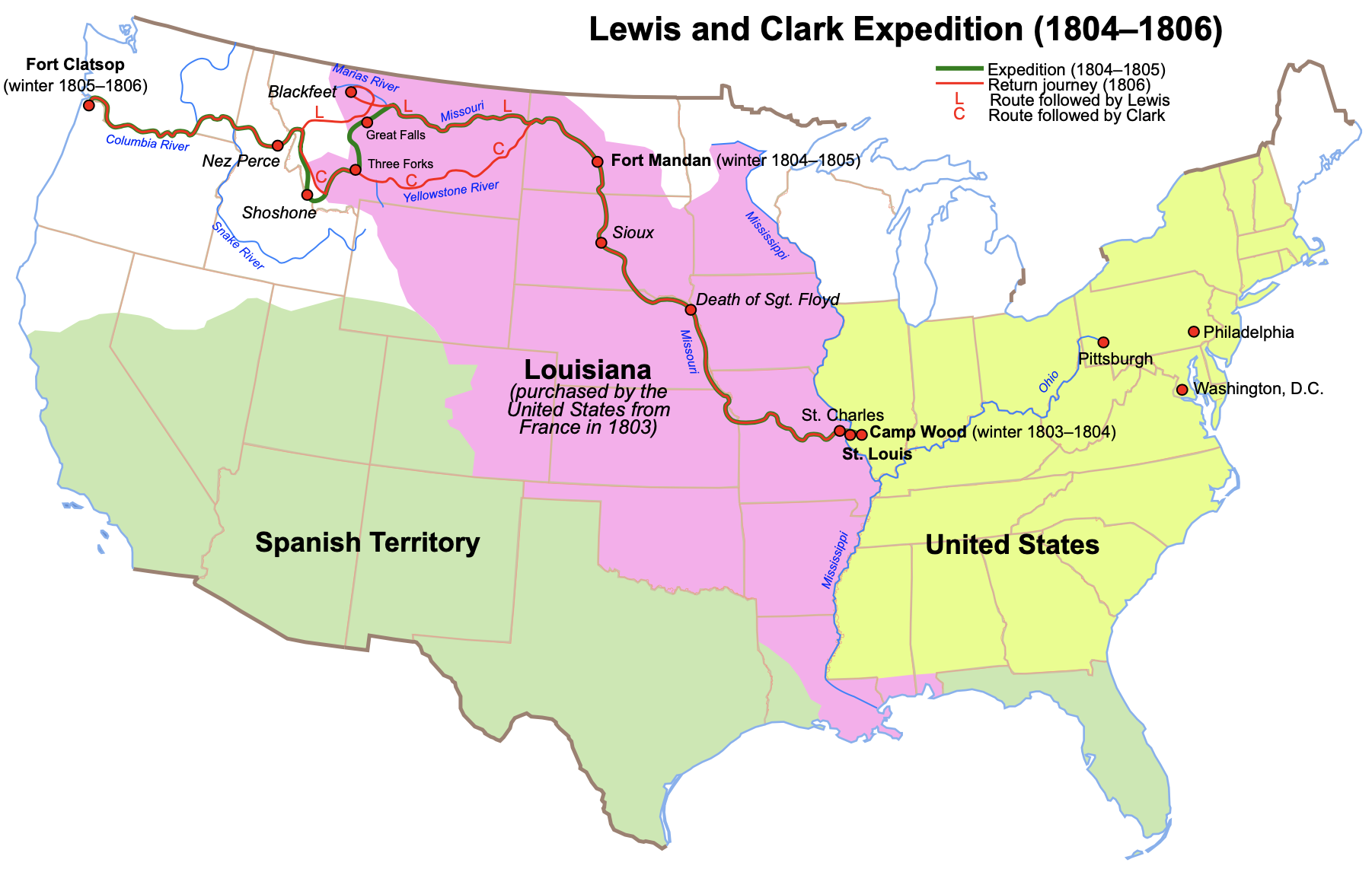Undaunted Courage by Ambrose
Ref: Stephen Ambrose (1997). Undaunted Courage. Merriweather Lewis, Thomas Jefferson, and the opening of the American West. Simon & Schuster.
_____________________________________________________________
Summary
In 1801, the Louisiana Territory, that part of North America lying between the Mississippi River and the Rocky Mountains- was up for grabs. The contestants were the British coming out of Canada, the Spanish coming up from TX and CA, the French coming up the Miss-Missouri from New Orleans, the Russians coming down from the NW, and the American’s coming from the East. And, of course, there were already inhabitants who possessed the land and were determined to hold it.
Whenever the constitution was silent, Jefferson, when in power, was willing to abandon a strict construction of the document in order to promote western expansion. His vision of the US stretched from sea to sea- and more than any other individual, he made that happen.
Northwest Passage: The dreamed for all water route across N. America that connects the Atlantic and Pacific.
Americans had but one Indian policy- get out of the way or get killed- and it was non-negotiable.
_____________________________________________________________
Louisiana Purchase
The NW Company and its rival, the Hudson’s Bay company. The British in Canada were the primary suppliers of manufactured goods to the Mandan’s. This was a situation Lewis intended to change. His policy, Jefferson's policy, was to isolate the Sioux, open the river from St. Louis to the Mandan’s, and establish an American trading monopoly at this great emporium of the Northern Great Plains.
_____________________________________________________________
Lewis & Clarke Expedition
Using the octant (in the summer) or the sextant (in the winter), Lewis would “shoot” the sun at noon and take its altitude. He would then consult a table to determine latitude. The angle of the sun at high noon, together with the date, would tell him for certain how far north of the equator he was.
Communication: The wives could talk to Charbonneau in Hidatsa, who would speak in French to Drouillard, who would pass it on to the Captains. A native would say a word to Sacagawea, who would pass it on in Hidatsa to Charbonneau, who would pass it on in French to Jussaume, who would translate it into English for the Captains.
_____________________________________________________________
Native Americans
There could be no living with the Indians until they had been civilized or cowed or brought into the American trading empire and thus made dependent on the government.-Merriweather Lewis.
Good relations with the tribes of the Missouri were “indispensable” to the policy of governing those Indians by commerce rather than by arms.-Thomas Jefferson.
The terms peace and war as understood by the Americans had no meaning to the Indians. Hostilities could break out at any time, for no apparent cause other than the restlessness of the young warriors, spurred by their desire for honor and glory, which could only be won on raids, which always brought on revenge raids, in a regular cycle.
The warrior went on to make a fundamental point: “The chiefs were now old and must shortly die and the nation could not exist without chiefs. In two sentences, the Hidatsa brave had exposed the hopelessness of the American policy of inducing the Missouri River and Rocky Mountain Indians to become trappers and traders. They would have to be conquered and cowed before they could be made to abandon war. Jefferson’s dream of establishing persuasion and trade a peaceable kingdom among the Western Indians was as much an illusion as his dream of an all-water route to the Pacific.
The policy was to “exchange lands which they (the Indians) have to spare and we want for necessaries, which we have to spare and they want.” Trading posts should be established among them and the agents should extend credit. Soon the Indians would “run into debt.” When their debts mounted, “they become willing to lop them off by cession of lands.” Jefferson concluded, “in the whole course of this, it is essential to cultivate their love. As to their fear, we presume that our strength and their weakness is now so visible that they must see we have only to shut our hand to crush them…”-Thomas Jefferson (writing to Harrison).
_____________________________________________________________
People
Merriweather Lewis
Lewis’ first task as Jefferson’s secretary was to go through a roster from the War DEPT listing all commissioned officers. Using a simple code of symbols (+++, 00, or #), Lewis passed a judgement on every officer in the Army.
Toussaint Charbonneau: A Frenchman living among the Hidatsa as an independent trader who worked for the NW Company. His teenage squaws (wives), including Sacagawea, were Shoshones (snakes), from a band that lived in the Rocky Mountains at the headwaters of the Missouri.
Enlisted by the Lewis and Clark Expedition to communicate with native American tribes along the Missouri and into the Bitterroots. Charbonneau chose Sacagawea, who was about 15.5years old and pregnant.
_____________________________________________________________
Misc Quotes
In 4 minutes, the turning earth moves 1 degree in longitude.
“I tremble for my country when I reflect that God is just.”-Thomas Jefferson.
“How is it that we hear the loudest yelps for liberty from the drivers of Negroes?”-Dr. Samuel Johnson.
I was “determined to sell my life as deerly as possible.”-Merriweather Lewis.
“It was impossible to find a character who to a complete science in botany, natural history, mineralogy, and astronomy, joined the firmness of constitution and character, prudence, habits adapted to the woods, and a familiarity with the Indians manners and character, requisite for this undertaking. All the latter qualifications Capt. Lewis has.-Jefferson (on why he chose Lewis).
“With such men I have everything to hope, and but little to fear.”-Merriweather Lewis.
“As I have always held it a crime to anticipate evils I will believe it a good comfortable road until I am compelled to believe differently.”-Merriweather Lewis.
“Those unknown formidable snow-clad mountains (the Bitterroots) which the party was about to attempt on the bare word of a savage (old toby) while 99/100th of his countrymen assured us that a passage was impracticable.-Merriweather Lewis (on the Bitterroots).
“I care but little (about salt)…having from habit become entirely cearless about my diat.”-William Clark.
“We shall endeavor to impress them strongly not only with our justice and liberality, he wrote, but with our power.-Thomas Jefferson (on Traditional American Policy).
Keep the peace. Civilize the tribes, trade with them, and get title to their lands.
“Were I to dwell on the advantages of this country I might fill a volume.”-Merriweather Lewis.
“Were I to describe the blessings I desire in life, I would be happy in a few but faithful friends. Might I choose my talent, it should rather be good than learning. I would consult in the choice of my house, convenience rather than state; and, for my circumstances, desire a moderate but independent fortune. Business enough to secure me from indolence, and leisure enough always to have an hour to spare. I would have no master, and I desire few servants. I would not be led away by ambition, nor perplexed with disputes. I would enjoy the blessings of health but rather be beholden for it to a regular life and an easy mind, than to the school of Hippocrates. As to my passions, since we cannot be wholly divested of them, I would hate only those manners rendered them odious, and love only where I knew I ought. Thus would I pass cheerfully through that portion of my life which cannot last always, and with resignation wait for that which will last forever.”-Merriweather Lewis.
“I deem it improper to trammel your operations by detailed and positive commands as to the plan of procedure.”-Merriweather Lewis.
“In future, I will live for mankind, as I have heretofore lived for myself.”-Merriweather Lewis.
“The country is so totally given up to the spirit of party, that not to follow blindfold the one or the other is an inexpiable offence.”-Sen. John Quincy Adams.
“We are become as numerous as the leaves of the trees, and, tho we do not boast, we do not fear any nation…My children, we are strong, we are numerous as the stars in the heavens, and we are all gun-men.”-Thomas Jefferson’s (standard great father talk).
“They have vexed me in such a manner by such repeated acts of villainy that I am quite disposed to treat them with every severity, their defenseless state pleads forgiveness so far as respects their lives. On April 21 Lewis had all the spare poles and paddles placed on the canoes. Then he set fire to the pile. He was determined to make certain that “not a particle should be left for the benefit of the Indians.”-Merriweather Lewis (on the Native Americans).
“I am fully convinced that we shall shortly derive the benefits of a most lucrative trade from this source, and that in the course of 10 or 12 years a tour across the continent by the route mentioned will be undertaken by individuals with as little concern as a voyage across the Atlantic is at present.”-Merriweather Lewis (on the expedition).
_____________________________________________________________
Chronology
Apr, 1811: John Jacob Astor establishes a trading house at Astoria on the OR Coast, the first settlement on the W Coast.-Undaunted by Ambrose.
11 May, 1809: Merriweather Lewis commits suicide at Grinders Tavern in TN.-Undaunted by Ambrose.
14 May, 1804- 23 Sep, 1806: The Lewis and Clarke Expedition explores the Louisiana Purchase.
1806: Lewis and Clark Expedition members Dickson, Hancock, and Colter depart under a shared Yellowstone venture. Colter later discovered Yellowstone National Park.
15 Sep, 1804: The Lewis and Clark expedition come up to the mouth of the Kansas River, climbing a hill “which appeared to have a commanding situation for a fort, the shore is bold and rockey immediately at the foot of the hill, from the top of the hill you have a perfect command of the river.” They were standing in what is today’s downtown Kansas City, Missouri.-Undaunted by Ambrose.
4 Jul, 1803: The Louisiana Purchase; the US purchases France’ Louisiana territories.
1795: Merriweather Lewis (aged 21) is transferred to the rifle company of elite riflemen-sharpshooters, under Captain William Clark.-Undaunted by Ambrose.
1794: Whiskey Rebellion occurs after US Treasury Secretary Alexander Hamilton lays an excise tax on whiskey, the principal product of the trans-Appalachian region.-Undaunted by Ambrose.
30 Apr, 1793: US Secretary of State Thomas Jefferson writes instructions “to find the shortest and most convenient route of communication between the US and Pacific Ocean, within the temperate latitudes.” Since that was almost certain to be the Missouri River, “It has therefore been declared as a fundamental object of the subscription, (not to be dispensed with) that this river should be considered explored.”-Undaunted by Ambrose.
11 May, 1792: American Sea Captain Robert Gray sails his ship Columbus into the estuary of the Columbia River. Later that month, Gray met and traded information with Captain George Vancouver, who was making an official voyage of discovery of the Pacific Coast for the British Government.-Undaunted by Ambrose.
_____________________________________________________________

